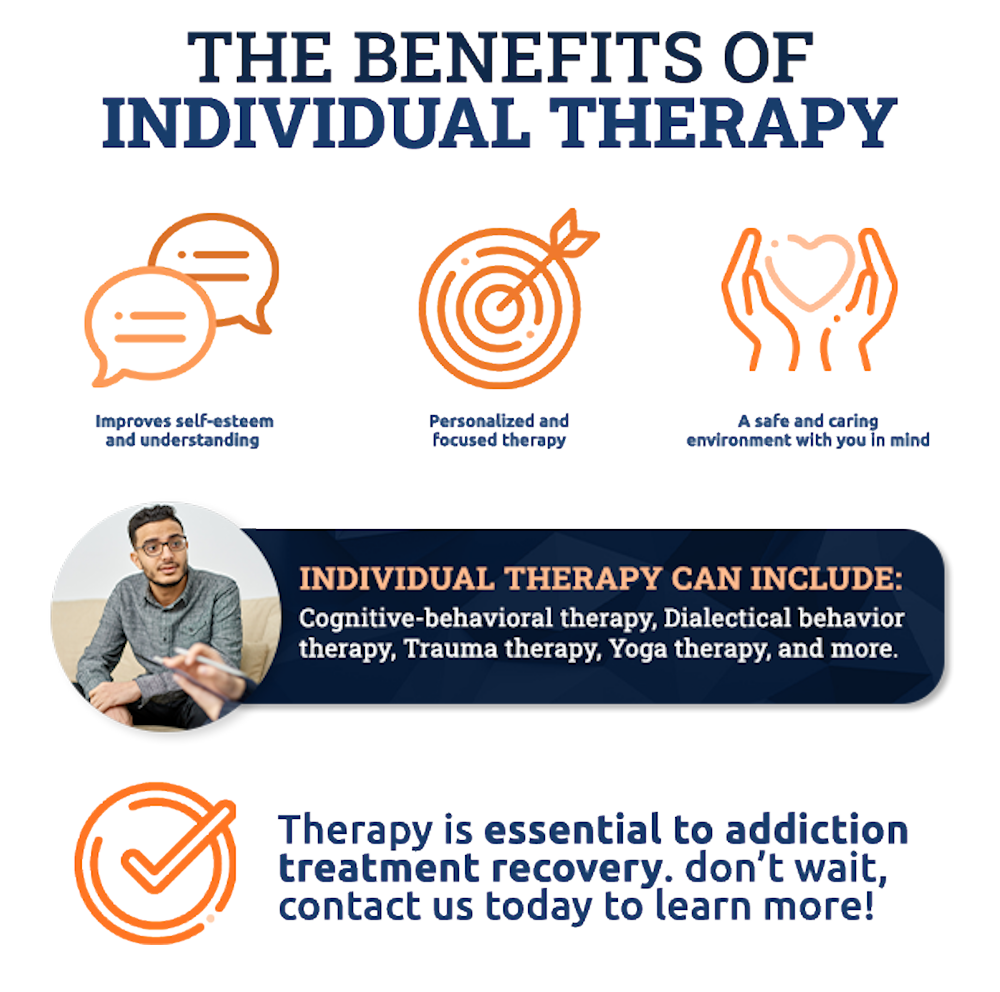One of the essential parts of successful drug rehab treatment is implementing a supportive individual therapy program. Throughout the addiction therapy services Northern Illinois Recovery Center offers, it is crucial to address your thoughts, feelings, and emotions. For many, this means working in a one-on-one environment with a counselor or therapist to identify, explore, and learn how to address issues impacting mental health and substance use disorder. An individual therapy program plays a significant role in your individualized treatment. An individual therapy program also ensures that you can open up about how you feel and address past, present, and future concerns.
For many, working one-on-one is the best way to develop trust and improve one’s communication skills. In individual therapy, you’ll learn techniques and skills to help you address, avoid, and overcome triggers. Clients also learn healthy coping mechanisms that they can practice outside of therapy. As clients progress, they learn more about themselves and others as treatment is adjusted to meet their changing needs.

What is an Individual Therapy Program?
Characteristics of an individual therapy program include:
- Individual counseling and one-on-one therapy
- Evidence-based therapy techniques
- Qualified staff
- Licensed therapists
- A safe environment free from judgment
- Providing individualized care for your specialized needs
Individual Therapy vs. Group Therapy
Individual therapy sessions can provide an intimate setting for patients to address their mental health. Talk therapy is a wonderful tool with a deep history of tackling behavioral health. Social workers can also perform therapy services. Group therapy services are effective to introduce multiple perspectives from group members. Socialization skills are quite important for those in recovery because those with mental health issues tend to isolate or are misunderstood. Group therapy may not be suited for everyone — someone would feel more comfortable in individual sessions to discuss topics such as sexual orientations.
Supportive family sessions are another comprehensive approach to treating the whole person and how their relationship problems could have arisen. These health services are impactful for patients without a strong support system. Family involvement could allow the children and adults to speak openly about their wellness and ability to heal. For example, substance use can show the codependent relationships that are built within families.
Therapy and Addiction Treatment
- Cognitive-behavioral therapy
- Dialectical behavior therapy
- Family therapy
- Group therapy
- Yoga therapy
- Trauma therapy
Developing a positive outlook is beneficial during recovery because treatment can be trying. Substance use can fill the whole person with doubts, especially young adults. Changing your lifestyle and deciding to stop using drugs and alcohol is stressful and, at times, overwhelming. Therapy through individual sessions helps you deal with those feelings and creates a healthy outlet for you to express your emotions. If you struggle with trauma, therapy can help you navigate painful past experiences while working on your recovery from addiction.

What Can I Expect from Individual Therapy Sessions?
In individual counseling, you will meet with a therapist one-on-one to discuss your thoughts and feelings. The therapist will help you identify the root of your problem and work with you to find solutions through a treatment plan. Individual counseling can last for a few sessions or continue for several months, depending on your needs. Individual therapy sessions can bring up challenging subjects, so it’s vital to develop a bond.
Cognitive-behavioral therapy is one type of individual counseling. This therapy focuses on how your thoughts, feelings, and behaviors are interconnected. The therapists specialize in techniques to help patients identify negative thought patterns and replace them with positive ones.
If you are considering individual counseling, it is important to find a therapist that you feel comfortable with. You may want to ask friends or family members for recommendations or do some online research. Additional resources may be available through your school or workplace. It is important to find a therapist who specializes in the type of counseling you need.
Dialectical behavior therapy is a type of individual counseling that is often used to treat borderline personality disorder. This type of therapy focuses on helping you regulate your emotions and change behaviors that are harmful to yourself or others. Dialectical behavioral therapy services was intially used to treat women with suicidal tendencies. Multiple studies have shown that patients can recover through dialectical behavioral therapy.
Interpersonal psychotherapy is a type of individual counseling that is often used to treat mental health conditions such as depression and anxiety. This type of therapy focuses on the relationships you have with others. The therapist will help patients identify and address conflicts in your relationships. Interpersonal psychotherapy has been effective at treating young adults and adults.
Among other mental health services, interpersonal psychotherapy has been used to treat mental health conditions such as:
- Anxiety
- Bulimia nervosa
- Chronic fatigue
- Mood disorders such as bipolar and dysthymic disorders
Family therapy is a form of therapy that is used to treat mental health conditions that are impacting the whole family. A family can be a central tenant for mental health wellness. Family involvement can drastically impact a person’s recovery, especially children and young adults. This type of therapy helps families focus on communicating better and resolving conflicts. The therapist will also offer support to the family members. Family therapy can be used to treat conditions such as addiction, mental illness, and behavioral problems. Supportive family sessions may be what you need to have your voice heard.
Group therapy is a type of therapy that is used to treat mental health conditions. In group therapy, you will meet with a group of people who are also struggling with similar issues. The therapist will lead the group and provide support. Group therapy can be helpful for conditions such as addiction, depression, and anxiety.
Yoga therapy is a type of therapy that uses yoga to treat mental and physical health conditions. Yoga therapy can be used to treat conditions such as anxiety, depression, and chronic pain. In fact, addiction treatment programs may offer yoga as a complementary form of treatment.
Trauma therapy is a form of therapy that is used to treat trauma. Trauma therapy can be individual or group therapy. It is a type of therapy that focuses on the symptoms of trauma and helps you to deal with them. Trauma therapy can be helpful for conditions such as post-traumatic stress disorder (PTSD). Trauma therapy is useful for treating the symptoms of trauma, but it is not a cure for PTSD.

What is Telehealth Therapy?
Telehealth therapy is convenient for the patient and the therapist. Private or public transportation is not necessary to receive help anymore — the therapist can see the patient from anywhere in the world. The patient does not have to leave home to get help. Payment online therapy can be accepted by a health insurance company considering the effectiveness.
How Effective Is Online Therapy or Telehealth?
What are the Advantages of Individual Counseling?
Other services such as motivational interviewing and medication management could be used for individual therapy programs to help ensure their conditions are met. Motivational interviewing could be beneficial for those who have experienced CBT (Cognitive-Behavioral Therapy). The primary focus of motivational interviewing is to improve a person’s quality of motivation to commit to recovery. Motivational interviewing has been shown to be effective in those who are voluntarily and required to attend addiction treatment programs.
What are Common Mental Health Conditions People are Diagnosed With?
- Anxiety disorders
- Depression
- Eating disorders
- Obsessive-compulsive disorder
- Posttraumatic stress disorder
- Substance abuse disorders
How Can Individual Counseling Help Co-occurring Disorders?
What Types of Topics Are Discussed in Individual Counseling?
- Anxiety
- Depression
- Eating disorders
- Obsessive-compulsive disorder
- Posttraumatic stress disorder
- Suicide
- Grief
How to Build a Relationship with Your Individual Therapy Counselor
Here are a few tips for building a trusting relationship with your individual therapist:
- Be honest with your therapist. Honesty is critical for the success of therapy.
- Be open to feedback from your therapist.
- Follow through with homework assignments from your therapist.
- Communicate openly and honestly with your therapist about how you’re feeling.
What are the Costs Associated With an Individual Counseling Program?
Do I Need Insurance to See an Individual Therapist?
Are You Struggling with Substance Abuse or Addiction Issues?
Choosing a rehab that understands your needs and offers programs that utilize evidence-based approaches can be difficult. If you’re ready to get started, call Northern Illinois Recovery Center today. Our facility has the experience, training, and knowledge to help you recover from addiction with an individual therapy program





